
About Andrew Cusack
 Writer, web designer, etc.; born in New York; educated in Argentina, Scotland, and South Africa; now based in London.
Writer, web designer, etc.; born in New York; educated in Argentina, Scotland, and South Africa; now based in London. read more
News
Blogs
Reviews & Periodicals
Arts & Design
World
France
Mitteleuropa
Knickerbockers
Argentina
The Levant
Africa
Cape of Good Hope
Netherlands
Scandinavia
Québec
India
Muscovy
Germany
Academica
British Columbia in London
Colonial Agents & Provincial Agents-General in the Imperial Capital
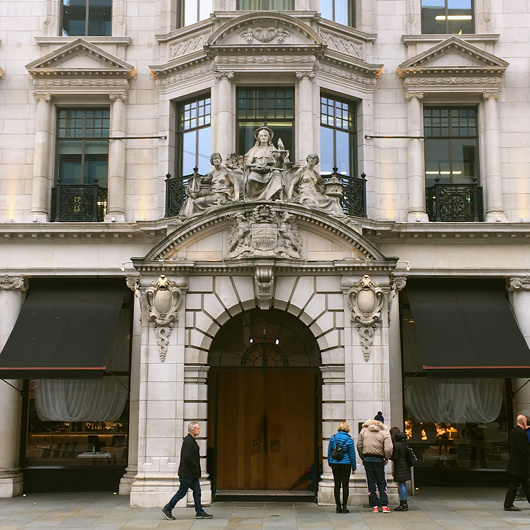
JUST WHERE THE elegant Edwardian urbanity of Waterloo Place turns into Regent Street there is an edifice that announces itself as home to the “Agent General for British Columbia”. Built in 1914-1915, it was designed by a not particularly prominent architect named Alfred Burr who did a lot of work for the Metropolitan Police and is also responsible for designing the charming little curator’s lodgings next to Dr Johnson’s House (which he restored 1911-1912).
The listing that protects British Columbia House, at 1-3 Regent Street, describes its style as “rich Baroque with both Roman and Genoese palazzo features composed on a large scale”.
The main entrance is on Regent Street with the province’s delightfully sunny coat of arms carved above the portal, guarded by allegorical figures of Justice and the like above. On the corner with Charles II Street, the inscription on the foundation stone proclaims its laying at the hands of Prince Arthur, Duke of Connaught on the sixteenth day of July in 1914.
But who or what on earth was the Agent General for British Columbia?
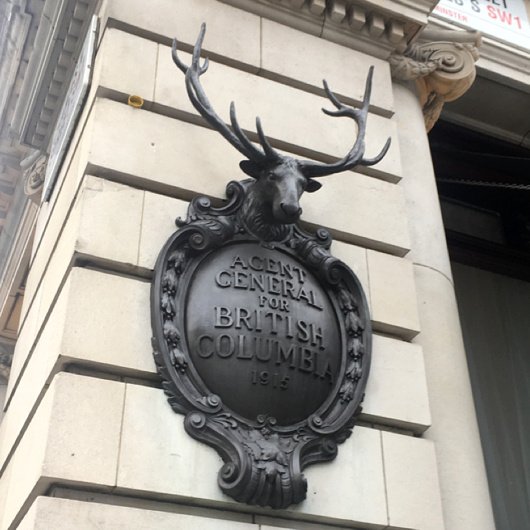
Diplomatic relations amongst Commonwealth countries are different than amongst non-member states. The French Republic sends an Ambassador to the United States of America, and vice versa, but Australia and India (for example) exchange High Commissioners instead. Both those countries have prominent High Commissions (instead of embassies) in the former imperial capital of London where the Commonwealth is headquartered.
But before the Commonwealth of Nations was the family of sovereign realms and states we know today there was the British Empire, and individual colonies often found it worth their while to have representatives in London where their fates were often determined by Parliament and the Crown.
Most of the business of these early colonial agents was with the Board of Trade which strictly controlled the economic interaction between the mother country and her daughter colonies. They could also be found defending the colony that employed them in legal cases that came up before the Privy Council.
Agents were hired by colonial governments and did not necessarily have any existing relationship with the colony itself. Edmund Burke, for example, was the London agent for the Province of New York from 1771 until the American Revolution. Others were colonial natives themselves, like Benjamin Franklin who represented Pennsylvania as well as Massachusetts, New Jersey, and Georgia, or Charles Pinckney who was Agent for South Carolina.
Most of the North American colonies seized their independence but other colonies began to appoint Agents-General to more formally represent them in the chief city of the empire. If these colonies became independent they began to send High Commissioners (if they remained in the Commonwealth) or Ambassadors (if they left it).
As things developed, some colonies did not become independent separately but federated with others to create new countries like Canada, Australia, South Africa, and Nigeria. The component provinces, states, or regions of these new countries still found it worthwhile to be represented apart from their national governments, often for purposes of trade promotion or to emphasise their difference in the federal system.
When a coup abolished Nigeria’s regions they ceased to send agents-general to London, and many others stopped in the 1990s. London hasn’t seen agents-general for Manitoba since 1965, Nova Scotia and Tasmania since the 1980s, New South Wales since 1991, Alberta and British Columbia since 1992, and Ontario since 1994.
Quebec, Western Australia, Victoria, and South Australia each still maintain an Agent General in London — Quebec’s arguably being the most prominent and exerting the greatest presence.
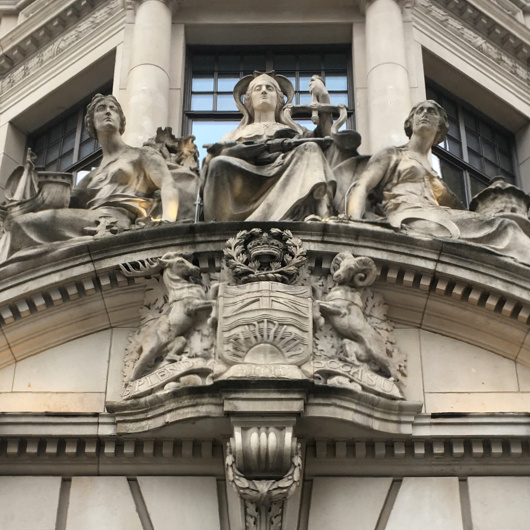
What purpose did British Columbia House actually serve? As a provincial government document put it at the time, “Almost every phase of human interest affecting the people of British Columbia and the Motherland in their relation to each other enters into the work performed by British Columbia House.”
At BC House, potential investors could find out about the province’s rich resources while tourists could find out more about British Columbia’s attractions as well as practical information on how to get there. About half the enquiries at the Regent Street building were about emigration.
Meanwhile, British Columbians visiting London or the continent could use BC House to book hotel rooms, get shopping recommendations, make travel arrangements, and read the province’s newspapers. “The Agent-General and Secretary consider it a privilege to meet and be of service at all times to all visitors from the Province.” During the Second World War, the Agent-General provided a canteen in the House where visiting British Columbian servicemen could meet one another.
Provincial officials were quite proud that, because extra office space in the building was rented out, British Columbia’s representation in London was almost self-sufficient and required very little subsidy from the province’s coffers.
The Agents-General for the various colonies probably met from time to time for a chit-chat. Indeed, that may be how Alfred Burr was chosen to design British Columbia House: he had done earlier work for the government of the Australian state of Victoria at Melbourne Place in the Strand. Victoria House was built 1907-1908 but just a few years later was entirely incorporated into Australia House when it was built.
While British Columbia stopped appointing an Agent-General in the 1990s, it appears that BC tourism and investment offices remained here in Regent Street into the twenty-first century. They have now moved to Aldwych, and British Columbia House is owned and operated by the Crown Estate.
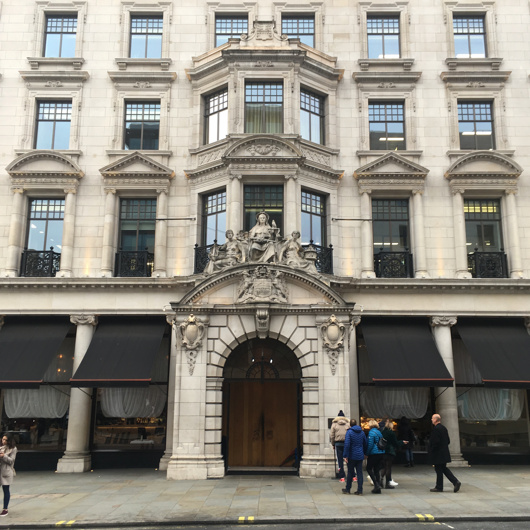
Search
Instagram: @andcusack
Click here for my Instagram photos.Most Recent Posts
- Bicycle Rack April 29, 2024
- Burns Tower April 19, 2024
- Patrick in Parliament March 18, 2024
- Articles of Note: 13 March 2024 March 13, 2024
- Cambridge March 9, 2024
Most Recent Comments
Book Wishlist
Monthly Archives
Categories

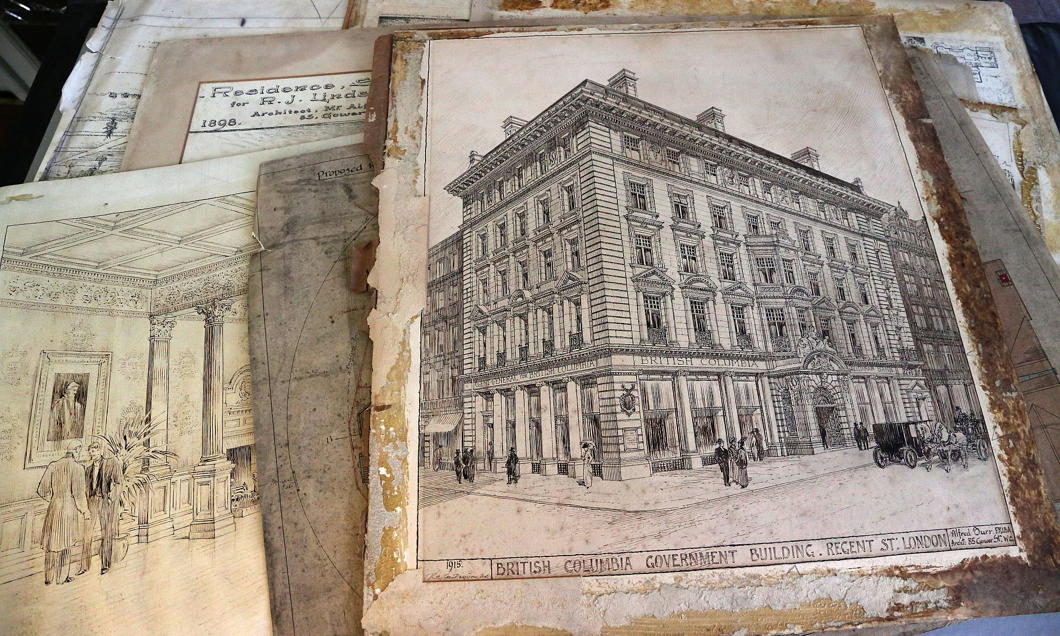


Talks are advanced on restoring the role of NSW agent-general to London and the NSW Cabinet is considering candidates. More here: https://www.canberratimes.com.au/story/6359909/nsw-could-revive-uk-agent-general-role/?cs=14231